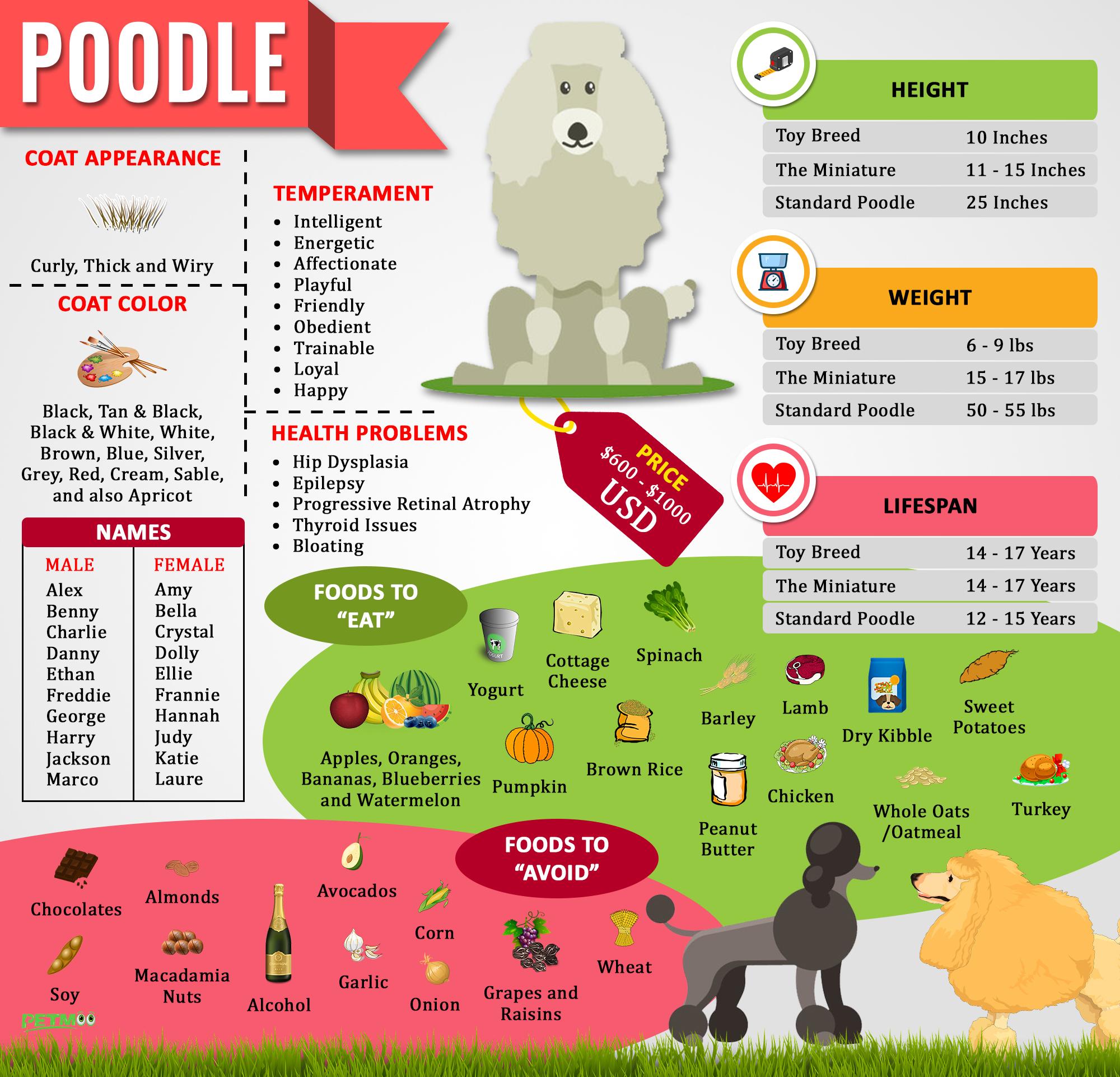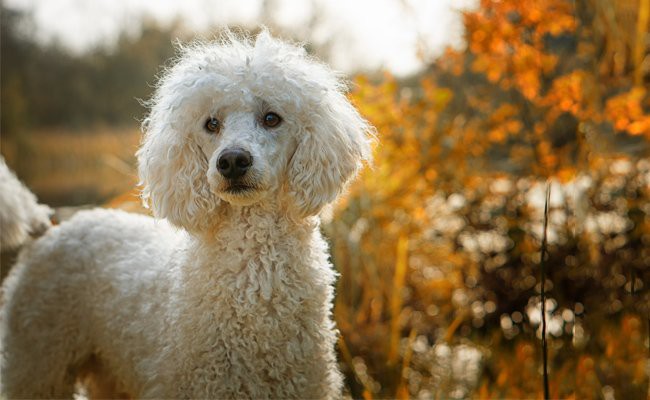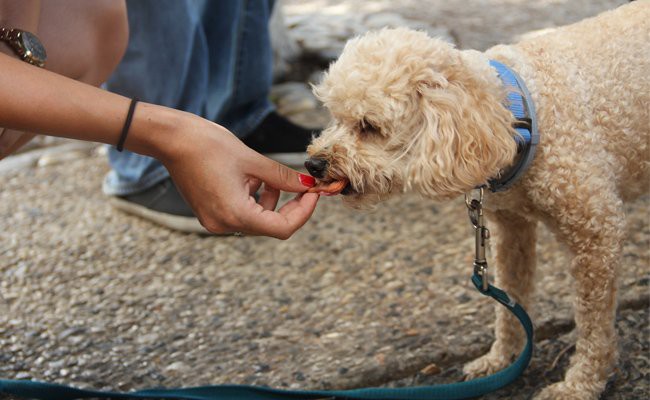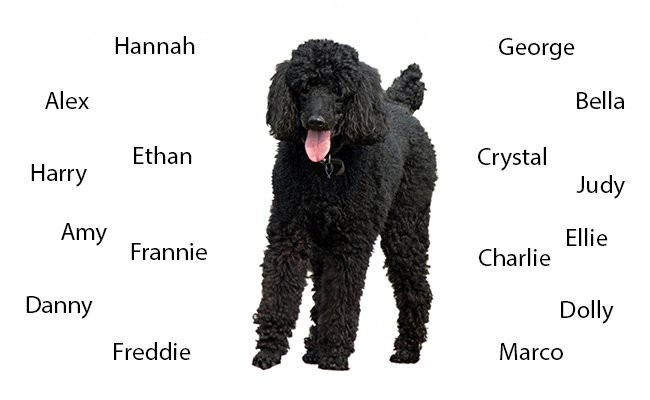Dog Pregnancy Calculator And Timeline
Poodles are also a celebrity in their own way! It has its name in the top favorite family dog breed list and consistently ranked in the top 10 positions by the American Kennel Club.
However, a question still remains regarding the place of origin like whether it is from Germany or France.
These dogs were bred for hunting where if the hunted animal happened to fall into some body of water, then the poodles will retrieve it from the water.
Poodle Facts
Poodle Coat Color
The coat of this dog breed can be in either of the colors: Black, Tan & Black, Black & White, White, Brown, Blue, Silver, Grey, Red, Cream, Sable, and also Apricot.
The hair is curly, thick and wiry and needs good grooming and maintenance.
Poodle Appearance
Poodles are of three types:
- Standard
- Miniature
- Toy
The size of these dogs will differ but their appearance is similar.
Dogs that may be medium to large sized with a squarely built appearance. Their head is well chiselled and in proportion to their body.
Generally, they have oval-shaped eyes that are dark and expressive.
These dogs have a long muzzle and a rounded skull with a slight stop. Also, they have wide-set ears that hang close to their head. Their tails are docked. It walks with a springy gait.
Poodle Size And Lifespan
Poodle Size
Toy breed is 10 inches in height and 6 to 9 pounds in weight. Not to mention, the Miniature is 11 to 15 inches tall and weighs 15 to 17 pounds. The height of a standard Poodle is 25 inches and its weight is between 50 to 55 pounds.
Poodle Lifespan
The average lifespan of this dog breed can be 12 to 15 years but it is dependent on how well its health is maintained. The lifespan of a Miniature Poodle and Toy Poodle are between 14 to 17 years. However, Toy Poodles can live even for 20 years.
Types Of Poodles
In case if you continue to have a difficult time in deciding what type of dog you should buy, then wait for a second.
1. Teacup Poodles

- Weight – 2 to 12 lbs
- Height – 8 inches (max)
- Life expectancy – 15 to 20 years
Of the entire available poodle breed, this is the smallest of the lot. Teacup poodles as the name suggest is in fact as small as a teacup.
In general, they are exotic teacup dogs. Even though this dog breed looks small, this teacup dog breed is very popular in America.
2. Klein Poodles

- Weight – 20 – 35 lbs
- Height – between 14 and 18 inches (max)
- Life expectancy – 12 to 15 years
This breed is not officially recognized by the AKC and hence this dog cannot be your partner in dog shows. Originally from Europe, Klein poodles are also called medium in France.
Overall, they are popular in America but because of their size, they are only suitable as home pets.
3. Miniature Poodles

- Weight – 14 – 17 lbs(female), 15 – 17 lbs(male)
- Height – 11 to 15 inches
- Life expectancy – 15 years
In fact, miniature poodles are much smaller than the well-known Standard small dog poodles but quite bigger than the toy poodles. Also, the dog coat looks dense and curly which requires regular grooming.
Not to mention, they need regular mental and physical exercise for overall wellness.
4. Toy Poodles

- Weight – 6 – 11 lbs(male), 6 – 9 lbs(female)
- Height – 9.4 to 11 inches
- Life expectancy – 15 years
Firstly, toy poodles and standard poodles carry similar coat texture. And, despite the shortages in physical appearance, toy poodles are springy, athletic in gait.
In general, these dogs prefer peaceful and quiet households. Finally, at times, they can behave too-skittish or nervous. In case, if your dog training lacks competence, your dog can suffer from socializing skills.
Dental Problems
They are known to suffer from serious dental issues than standards. They might suffer from tartar problems and gradually affects the roots and gums and hence dental care should be given a priority concern.
5. Standard Poodles

- Weight – (Males)20 to 32 kg or 45 – 70 lbs, (Females) 20 to 27 kg or 45 – 60 lbs
- Height – 18 to 24 inches
- Life expectancy – 12 years
As a matter of fact, these dogs appear as pampered or spoiled small dogs. They are cute-looking, energetic, and agile dogs which possess excellent jumping skills.
To sum up, they can be good watchdogs and needs mental stimulation and exercises to remain healthy.
French Poodle

Whether Toy, Miniature, or Standard, and either apricot or black, the Poodle dog stands as a true testimony among other breeds. The most fascinating and friendly dog stands tall beneath the hypoallergenic, curly coat.
A dog for all seasons, rain or shine, they would give you company no matter what. The national dog of France, the Poodles, and the locals will go crazy over this breed.
Bear in mind, there is no Poodle breed called “French Poodle.” The locals call them “duck dog” or Caniche.
Poodle Mix
Purebred Poodle dogs can be mixed with different purebred dog breeds. These crossbred dogs are gaining much popularity nowadays because of their cute looks and good temperament. Poodles are hypoallergenic dogs and hence the poodle mix breeds are widely sought after. The poodle mix breeds may be designated as designer dogs. Recently you find a good number of these mix dogs. The popular mix breeds are:
- Goldendoodle – Golden Retriever + Poodle
- Australian Labradoodle – Labrador Retriever + Poodle
- Aussiedoodle – Australian Shepherd + Poodle
- Cockapoo – Cocker spaniel + Toy Poodle
- Sheepadoodle – German Shepherd + Poodle
- Poogle – Beagle + Poodle
- Bichon Poodle(Poochon) – Bichon Frise + Poodle
- Maltipoo – Maltese + Toy Poodle
- Westiepoo – West Highland White Terrier + Poodle
- Pomapoo – Pomeranian + Poodle
- Saint Berdoodle – Saint Bernard + Poodle
- Cavapoo – Cavalier King Charles Spaniel + Poodle
- Newfypoo – Newfoundland + Poodle
- Whoodle – Wheaten Terrier + Poodle
- Bernedoodle – Bernese Mountain Dog + Poodle
- Rottle – Rottweiler + Poodle
- Bordoodle – Border Collie + Poodle
- Boxerdoodle – Boxer + Poodle
- Yorkipoo – Yorkshire Terrier + Poodle
- Shihpoo – Shih Tzu + Poodle
- Schnoodle – Schnauzer + Poodle
- Peekapoo – Pekingese + Poodle
- Chipoo – Chihuahua + Poodle
- Doxiepoo – Dachshund + Poodle
Poodles Training
Bear in mind, they are super-brilliant dogs.
Of course, they appear smart, graceful, agile, and can excel in tracking, obedience, and agility activity.
Being people-oriented dogs, ensure that the dog training programs are positive and fun.
Training a poodle for tasks and tricks will be interesting and exciting.
How to Train Your Poodle?
There are lots of intelligent dog breeds like the Golden Retriever and German Shepherd that prove to be good companion dogs too.
They are high energy, ready to please, and a remarkably brilliant dog that is top notch when obedience is the talking point.
They make excellent pets. When you talk about training, Poodles are quite stubborn dogs. With patience, you can turn them into a friendly and well-mannered companion.
How to Crate Train a Poodle Dog?
1. Buy a crate
- Get a good quality crate and kindly pick a crate that’s big enough for your dog.
- The crate should make him feel peaceful and not make him feel
Ideal Crate Size
- Miniature Poodle- 24 X 18 inches
- Standard Poodle- 48 X 36 inches
2. Position the crate in a suitable location
- They love human company and hence, place the crate where people meet and mingle.
3. Motivate your Poodle dog to use the crate
- Place some treats inside the crate and wait for your dog to enter the crate.
- Do not force your dog so that he will never associate any negative feelings with the crate.
4. Shut the crate door
- After your pooch enters the crate, you start closing the crate behind him. First, close it for a few seconds and gradually increase the time the crate door is shut.
- Never open the door if your dog fusses or whines.
How to Housetrain Your Poodle Dog?
1. Start house training as early as possible
- Start house training your Poodle at the earliest. The longer you delay, the more strong bad habits can take shape.
- They are easy to house train.
- They carry excellent retention ability. Ensure that your dog remembers only the best bathroom habits.
2. Design an appropriate bathroom schedule
- Your dog should learn the right way to attend nature’s call.
- Puppies can manage to control their bladder for around 60 mins per month according to their age.
- Adult dogs can control their bladders for a much longer
3. Select a clean, safe bathroom place for your Poodle
- Ensure that your pooch uses the same place time and again to free himself.
- This will guide your dog to remember where he should
- For very small puppies, choose a place inside your house or use puppy pee pads.
- Pick a clean grassland if you are short of a yard.
4. Wait for your dog to relieve himself
- It could be easy to allow your Poodle to free himself only for a few minutes
- You should, in a general scenario, give your dog nothing less than 15 or 20 mins
5. Instantly appreciate good behavior and ignore bad ones
- As you continue to house train your dog, use positive reinforcement techniques such as extra petting and verbal praise.
- Avoid punishing your dog because it will make house training even harder.
How to Leash Train your Poodle Dog?
1. Prepare your dog to use a collar and leash
- The most important aspect is that your dog should get used to the collar and leash.
- Put the collar and make him wear while he’s doing other tasks.
- Try a flat, plain collar.
- Use a leash not less than 1.3 to 2.0 meters long.
2. Take quick walks
- Take your dog on quick walks and hold the leash as loosely as possible.
3. Train your Poodle to follow “heel” command
Place your pet on your left-hand side. Show him a treat you have in your right hand. Say “heel” and offer him a treat when he walks for at least 30 seconds on your side.
General Training Tricks for Poodles
1. Start with puppy kindergarten
Enroll your Poodle puppy in a kindergarten class; between 8-12 weeks of age. Proper puppy socialization will help your Poodle become more disciplined.
2. Adult Poodles require obedience training
Obedience training will teach your dog to learn simple commands such as heel, stay, and sit.
3. Fix short, daily training schedule
- Your pooch will hate long training schedules. Restrict your training to 8-10 minutes.
- Conduct the sessions with more enthusiasm and incorporate positive reinforcements.
- Consistent, daily training will ensure that you and your dog gain a close happy working relationship.
4. Teach him only one command
Fully learning one command after another command will give your dog the much-needed self-confidence and enthusiasm to master even more.
5. Maintain consistency
Consistency is vital when training a dog like a Poodle. For instance, when you make him “sit”, make sure he follows the same into his adult life.
6. Show who’s the boss at regular intervals
- Never let your dog think he can easily get away with bad behavior.
- If you find your dog getting fussy or impatient, end the session.
Poodle Temperament
- Intelligent
- Energetic
- Affectionate
- Playful
- Friendly
- Obedient
- Trainable
- Loyal
- Happy
Poodle Health Problems
Poodles are susceptible to various health problems.
1. Hip Dysplasia
Symptoms
- Depressed look on the face
- Laziness
- Limiting the usual daily activities
- Limited level of movement of the body
- Difficulty to stand up from a lying position
- Avoiding the daily habits of climbing stairs, running and jumping
- Lameness in the Hindlimb
- Narrow stance
- Bunny walk
- Loose joints
- The grating sound in the joints while walking
- Stiffness
- Enlargement of shoulder muscles due to pressure applied to the front leg while walking to compensate for the handicapped back leg
Causes
- Hereditary Factor
- Poor Diet
- Injury
- Excess exercise or No exercise
- Gaining excess body weight
Treatment
After studying the stage of the disease, a vet will decide to adopt the needed treatment method. In extreme cases, surgery will be done for a dog with hip dysplasia.
- Dietary management – Veterinarians generally recommend very low protein and fat content foods to avoid the risk of obesity which will put excessive stress on the hips.
- Physiotherapy – Soft exercises are recommended by a vet keeping in consideration the condition of loose joints and heavy loss of muscle mass in the dog’s thigh muscles.
- Medications – Drugs that are anti-inflammatory and non-steroidal will be given by the vets to dogs in order to decrease the pain and inflammation in hip dysplasia dogs. Oral medications like corticosteroids and opioids.
- Chondroprotective supplements like glucosamine, chondroitin sulfate, Vitamin C, Omega 3 and 6 fatty acids are given to the dogs to protect and lubricate its cartilage in joints.
- Surgery – Dogs with severe hip dysplasia will be operated by a vet after analysis of certain factors. The nature of surgery done on hip dysplasia dogs could be:
- Triple pelvic osteotomy (TPO) – Done on dogs below 10 months of age. The pelvis is cut in three places and the procedure done is called an osteotomy.
After the surgery, the pelvic socket will be able to rotate in a position such that it can cover the head of the femur. - Excision Arthroplasty – The head of the femur is removed and thereafter there is no bony contact between the femur and the pelvis.
- Total hip replacement – A prosthetic hip will be implanted in the place of the removed hip. The pain faced by the dog in its hip joints before surgery will be completely removed due to an implant of this artificial hip.
- Triple pelvic osteotomy (TPO) – Done on dogs below 10 months of age. The pelvis is cut in three places and the procedure done is called an osteotomy.
2. Epilepsy
Symptoms
- Head shaking
- Twitching of the muscles
- Stiffness
- Behavioural changes
- Noticeable change in the vocals, especially during barking, howling and whining
- Chewing
- Chomping
- Excess drooling from the mouth
- Temporary loss of vision
- Collapse on one side
- Unable to control urine or motion
- Loss of consciousness
Causes
- Congenital factor (defects that occur at birth)
- Breathing problems
- Liver problems
- Hypoglycemia
- Diabetes
- Kidney problems
- Brain Tumor
- Through toxins like lead
- Brain damage through a severe head injury
- Fevers
Treatment
The vets will recommend the daily intake of drugs like Phenobarbital and potassium bromide for dogs suffering from epilepsy.
Based on the nature of changes that happens in the epileptic dog’s body, the vet will decide on the new adjustments to be made to the dog’s drug intake level.
3. Progressive Retinal Atrophy
Symptoms
- Sluggish response during times of confusion or tension
- Slow response of pupils to light
- Unwillingness to jump on furniture during night time
- Reluctant to climb the stairs
- Greenish shine on the eye
- The greyish colour of the surface of the eye
- Cataracts
- Night blindness
- Bumping on the walls or furniture in the house
- Tripping over objects
Causes
Hereditary nature of the disease due to a defect in the retina that is caused by tissue degeneration.
Autosomal recessive gene carried by each parent
Treatment
Progressive retinal atrophy always ends in complete blindness. Dogs with PRA cannot recover since no medicine or surgical method is available until this moment.
For this reason, the dog owner can make some changes in the house like the slight rearrangement of furniture etc to make the life of the dog better to live with the disease.
4. Thyroid Issues

Thyroid issues in a dog could be either the condition of hyperthyroidism or hypothyroidism. The symptoms, causes and treatment are as follows:
Symptoms
- Lethargy (or) Dullness
- Excess weight gain
- Dry skin
- Hypersensitive to cold and heat extremities
- High blood cholesterol
- Slow heart rate or Bradycardia
- Hair Loss
- Anaemia
- Seizures
- Behavioural changes like depression and anxiety
- Diarrhea
- Vomiting
- Stress
- Rapid Breathing
Causes
- Hyperthyroidism – Overproduction of thyroxine, the thyroid hormone that enhances the metabolism rate of the body causes hyperthyroidism
- Hypothyroidism – Shrinking of the thyroid and tumour in the thyroid gland
Treatment
- For Hyperthyroidism – The usual treatments recommended by a vet for dogs with hyperthyroidism comprises:
- Radioactive Iodine (I-131)
- Anti-thyroid medications like Methimazole
- Thyroidectomy (surgery)
- For Hypothyroidism – Medications like synthetic T4 hormone called thyroxine is given as daily dosage until 6 weeks.
This is a life-long treatment that is given to dogs with hypothyroidism. The treatment is effective for the dog and makes it lead a healthy life.
5. Bloating

Symptoms
- Restlessness
- Nausea
- Difficulty in movement
- Breathing Difficulty
- Drooling
- Urinary or stool incontinence
- Severe Abdominal bloating
- Pain in the Abdomen
- Tachycardia (Fast rate of the heartbeat)
- Soft gums
- Body weakness
- Collapse
Causes
- Eating large meals
- Quick eating of meals
- Overeating
- Exercising after heavy eating or drinking a lot of water
- Genetic and other environmental factors
Treatment
Based on the condition of gastric bloat that a dog is suffering, the right treatment will be given by a vet. Generally, a vet will insert a tube on the throat of the affected dog for removing the gas and reducing the pressure.
In case if the dog suffers a twitched stomach muscle, then vets insert a hollow needle through the abdomen. The usual treatment for dogs with bloating and gastroenteritis includes medications and IV (intravenous) fluids.
Nevertheless, dogs with a twisted stomach muscle are operated after releasing the pressure from the dog’s stomach.
Finally, vets perform the surgery to correct the twitched stomach and restore it back to its proper functioning. Since relapse of the condition is possible, the veterinary surgeon will pin the stomach to the abdominal wall.
It is mandatory for a dog owner to ensure that when the dog is on the way to recovery from gastric bloat, the vet’s instructions are sternly followed. The vet will prescribe some dietary changes, in-house treatment and give some follow-up care procedures.
Poodle Grooming And Shedding
Grooming
These dogs have curly, fluffy coats but these coats need a dedicated amount of maintenance to keep them healthy.
You should brush your Poodle dog daily to prevent matting. If you fail to properly brush or comb your dog completely, the hair can mat near the hair roots.
Most owners try to keep their dogs in a shorter coat. Some owners do this trimming and grooming themselves while others hire a professional groomer.
This dog’s less shedding coat makes it an ideal choice for allergic people.
Shedding
Poodles are always considered as hypoallergenic dogs and this leads to the question, “ Do they actually shed ?”
These dogs share a single coat and the curly texture is similar to human hair where it can be groomed.
These dogs shed less compared to other dog breeds but these dogs definitely shed. Their curly coat is responsible for people to believe that Poodles do not really shed.
They lose hair and this hair gets stuck in their curly coat. This is the reason why their hair is not visibly seen on your home furniture.
Proper grooming will ensure that excess hair, dander, dirt, or mites are not present in your dog’s coat for a long period of time.
Food For Poodle
It is best advised to give foods that are issued by the AAFCO (Association of American Food Control Officials) standards because the foods given to a Poodle dog differs based on its age.
Generally, the foods with the appropriate level of protein, vitamins, carbohydrates and fats must be given to a dog is largely followed by the respective dog owners.
Foods that a Poodle dog eats
- Dry Kibble
- Barley
- Brown Rice
- Whole oats/oatmeal
- Fruits like apples, oranges, bananas, blueberries and watermelon
- Sweet Potatoes
- Pumpkin
- Spinach
- Yogurt
- Cottage Cheese
- Peanut Butter
- Chicken
- Turkey
- Lamb
Foods to “Avoid”
- Chocolates
- Alcohol
- Grapes and Raisins
- Macadamia Nuts
- Avocados
- Soy
- Wheat
- Corn
- Onion
- Garlic
- Almonds
Names For Your Poodle Puppy
| Male Dogs | Female Dogs |
|---|---|
| Alex | Amy |
| Benny | Bella |
| Charlie | Crystal |
| Danny | Dolly |
| Ethan | Ellie |
| Freddie | Frannie |
| George | Hannah |
| Harry | Judy |
| Jackson | Katie |
| Marco | Laure |
| Oscar | Sarah |
| Sammy | Tess |
Recommended Read: Majestic Names For Your Male Dogs, Cute Names For Female Dogs
Poodle Dog Price And Breeders
Poodle Price
The cost of a Poodle dog in the USA market can be at a price tag of between $600 and $1000. Always ask for vaccination details about a dog before buying.
Please do remember that show quality poodles will be more than the stated price. Likewise, top quality breeders can even charge premium prices.
Poodle Dog Breeders in the USA
- Farthing Poodles
Address: 36313 84th Ave E,
Eatonville, WA 98328
Tel.: 360-832-3747 - City Lights Standard Poodles
Address: Staten Island, NY 10314
Tel.: 917-699-1601
E-mail: poodlepups@lightsstandards.com - Emerald Coast Breeders
Address: 13430 Gulf Beach Hwy. #13
Pensacola, Florida 32507
Tel. #1: 850-982-6884, #2: 850-450-0299
E-mail 1: Christinehenderson3@cdx.net, 2: Barbarajenkins69@gmail.com
Poodle Dog Breeders in the UK
- Brock-o-Dale Rare Breeds
Address: Bath, England
Tel.: 01225 807362 - Ivanola
Address: Laurencekirk, South Aberdeen
E-mail: ivanolapoodles@gmail.com























